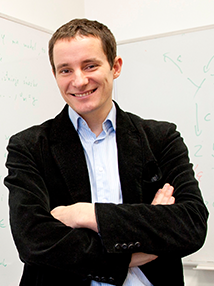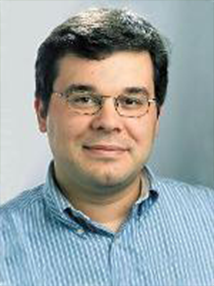Keynote Speakers
PROF. MIKOŁAJ BOJAŃCZYK
- Institute of Informatics, University of Warsaw, Poland
Title: Polyregular functions
I will describe a class of string-to-string transducers, which goes beyond rational or regular functions, but still shares many of their good properties (e.g. the inverse image of a regular language is regular). Unlike many string-to-string transducer models (including sequential, rational and regular transducers), which have linear size increase, the the new class (called polyregular functions) has polynomial size increase.
The main selling point of the polyregular functions is that they admit numerous equivalent descriptions: (a) automata with pebbles; (b) a fragment of lambda calculus; (c) a fragment of for-programs; (d) compositions of certain atomic functions, such as reverse or a form of string squaring; (e) mso string-to-string interpretations.
Short Bio: Mikołaj Bojańczyk is a Polish computer scientist and logician known for settling major open problems on tree walking automata jointly with Thomas Colcombet, and for numerous contributions to logic in automata theory. Bojańczyk became the first recipient of Presburger Award in 2010. He is currently a full-time Professor at the Institute of Informatics, University of Warsaw, Poland.
PROF. ERNESTO DAMIANI
- Department of Electrical Engineering and Computer Science, Khalifa University,UAE
Title: Certified Machine-Learning Models
The massive adoption of Machine Learning (ML) has deeply changed the internal structure, the design and the operation of software systems. ML has shifted the focus from code to data, especially in application areas where it is easier to collect samples that embody correct solutions to individual instances of a problem, than to design and code a deterministic algorithm solving it for all instances. There is an increasing awareness of the need to verify key non-functional properties of ML-based software applications like fairness and privacy. However, the traditional approach trying to verify these properties by code inspection is pointless, since ML models’ behavior mostly depends on the data and parameters used to train them. Classic software certification techniques cannot solve the issue as well. The Artificial Intelligence (AI) community has been working on the idea of preventing undesired behavior by controlling a priori the ML models’ training sets and parameters. In this paper, we take a different, online approach to ML verification, where novel behavioral monitoring techniques based on statistical testing are used to support a dynamic certification framework enforcing the desired properties on black-box ML models in operation. Our aim is to deliver a novel framework suitable for practical certification of distributed ML-powered applications in heavily regulated domains like transport, energy, healthcare, even when the certifying authority is not privy to the model training. To achieve this goal, we rely on three key ideas: i) use test suites to define desired non-functional properties of ML models, ii) Use statistical monitoring of ML models’ behavior at inference time to check that the desired behavioral properties are achieved, and iii) compose monitors’ outcome within dynamic, virtual certificates for composite software applications.
Short Bio: Ernesto Damiani joined Khalifa University as Chair of the Information Security Group and Program, and EBTIC as Research Professor. He is on extended leave from the Department of Computer Science, Università degli Studi di Milano, Italy, where he leads the SESAR research lab and is the Head of the Ph.D. Program in Computer Science. Ernesto’s research interests include secure service-oriented architectures, privacy-preserving Big Data analytics and Cyber-Physical Systems security.
Ernesto holds/has held visiting positions at a number of international institutions, including George Mason University in Virginia, US, Tokyo Denki University, Japan, LaTrobe University in Melbourne, Australia, and the Institut National des Sciences Appliquées (INSA) at Lyon, France. He is a Fellow of the Japanese Society for the Progress of Science.
He has been Principal Investigator in a number of large-scale research projects funded by the European Commission, the Italian Ministry of Research and by private companies such as British Telecom, Cisco Systems, SAP, Telecom Italia, Siemens Networks (now Nokia Siemens) and many others.
Ernesto serves in the editorial board of several international journals; among others, he is the EIC of the International Journal on Big Data and of the International Journal of Knowledge and Learning. He is Associate Editor of IEEE Transactions on Service-oriented Computing and of the IEEE Transactions on Fuzzy Systems. Ernesto is a senior member of the IEEE and served as Vice-Chair of the IEEE Technical Committee on Industrial Informatics. In 2008, Ernesto was nominated ACM Distinguished Scientist and received the Chester Sall Award from the IEEE Industrial Electronics Society. Ernesto has co-authored over 350 scientific papers and many books, including “Open Source Systems Security Certification” (Springer 2009).
PROF. EROL GELENBE
- Institute of Theoretical and Applied Informatics of the Polish Academy of Sciences
Title: Machine Learning for Cognitive Network Routing to Optimize QoS, Minimize Energy Consumption and Maximize Security
We will focus on the design principles and experimental results regarding the use of ML to optimize composite Goal functions that include the QoS, Security and Energy Consumption in Packet Networks. Three architectures will be described, based on the one hand on Cognitive Routers, secondly on Overlays, and thirdly on Software Defined Networks. All three approaches exploit Random Neural Networks that act as smart oracles for routing decisions and that are trained using reinforcement learning (RL). Each of the three approaches will be illustrated with experimental measurement results which show the effectiveness of the approach. The application to IoT network security will be illustrated from our recent results regarding the SerIoT Project that I am coordinating with funding from the European Commission.
Short Bio: Erol Gelenbe, FACM, FIEEE, FRSS, FIET, is a Professor in the Institute of Theoretical and Applied Informatics of the Polish Academy of Sciences. In 2009 he retired from Imperial where he was the Dennis Gabor Professor in the EEE Dept. (2003-2009). A citizen of France and Turkey, regularly listed in the 20 top researchers in Computer Science and Electrical Engineering in the UK, he is a Foreign Fellow of the Royal Academy of Sciences, Arts and Letters of Belgium (2015), Foreign Fellow of the Polish (2013) Science Academy, Honorary Fellow of the Hungarian Academy of Sciences, Fellow of the National Academy of Technologies of France (2008) and the Science Academy of Turkey (Bilim Akademisi) (2012), and of Academia Europaea (2005) where he is currently Member of the Informatics Section Committee. He is founding Editor-in-Chief of Springer-Nature Computer Science. According to the Mathematics Genealogy Project of the American Mathematical Society, he has graduated 86 PhD students, including 19 women, and 25 PhDs at Imperial College. His recent keynotes include: (i) Product form solution of tightly coupled G-networks, (ii) Saving Energy with Future Quantum Technologies, (iii) Lack of Security Violates Quality of Service, (iv) The Energy Packet Network Framework for Optimising Energy Consumption with Quality of Service. His comments on cybersecurity were broadcast live on the BBC Evening News, 26th June 2017. His publications are listed here. His two recent talks on the web site Serious Science regarding “Neural Networks” and “Cybersecurity” can be found at www.serious-science.org.

PROF. GUNNAR W. KLAU
- Department of Computer Science, Heinrich Heine University Düsseldorf, Germany
- Cluster of Excellence on Plant Sciences (CEPLAS), Germany
Title: Haplotype phasing or deciphering the scrolls from the four schools of Amathus
Human genomes are diploid, that is they come in pairs: every individual inherits one version of the genome from the mother and another version from the father. Hence, every genome exists in two similar yet distinct copies, called haplotypes. The problem of determining the full sequences of both haplotypes is known as phasing.
I’ll review different approaches for haplotype phasing and point out how they are formalized as optimization problems. Plant genomes can even be more complicated, they are often polyploid and exist in k copies where k is a low number larger than 2. I’ll present WhatsHap polyphase, our recent approach to polyploid phasing. Wherever approriate, I’ll highlight open algorithmic challenges and theoretical problems.
Short Bio: Since 2017, Gunnar Klau is professor for Algorithmic Bioinformatics at Heinrich Heine University Düsseldorf, Germany, and member of the German Cluster of Excellence on Plant Sciences (CEPLAS). Before, he was Fulbright Visiting Professor at Brown University and senior researcher at CWI Amsterdam, where he headed the Life Sciences group. His research interests are combinatorial algorithms and discrete optimization in bioinformatics with applications in biomedical research and plant sciences.
PROF. DIMITRIOS GUNOPULOS
- National and Kapodistrian University of Athens
Title: Urban Mobility Data: Challenges and Prospects
Human urban trajectory data collected from GPS-enabled mobile devices or vehicles are widely used in several applications including urban planning, traffic management, location based services. We consider several trajectory data analysis problems that come up in such settings. These include the problem of map creation from GPS trajectories, the problem of identifying frequently travelled paths, and the vehicle travel time estimation problem using historical data and real time data from only a small number of floating cars.
Short bio: Dimitrios Gunopulos got his PhD from Princeton University in 1995. He has held positions as a Postdoc at the Max-Planck-Institut for Informatics, Researcher at the IBM Almaden Research Center, Visiting Researcher at the University of Helsinki, Professor at the Department of Computer Science and Engineering in the University of California Riverside, Professor in the Department of Informatics and Telecommunications, National and Kapodistrian University of Athens, and Visiting Researcher, Microsoft Silicon Valley Research Center. His research is in the areas of Smartcities, Big Data, Data Mining, Databases, Sensor and Peer-to-Peer networks, Algorithms and Computational Geometry. He has co-authored over two hundred journal and conference papers that have been widely cited(h-index 72). His research has been supported by NSF (including an NSF CAREER award), the DoD, the Institute of Museum and Library Services, the Tobacco Related Disease Research Program, the European Commission, the General Secretariat of Research and Technology, AT&T, Nokia, a Yahoo FREP Award and a Google Faculty Award. He has served as a General co-Chair in SIAM SDM 2018, SIAM SDM 2017, HDMS 2011, and IEEE ICDM 2010 and as a PC co-Chair in ICDE 2020, ECML/PKDD 2011, IEEE ICDM 2008, ACM SIGKDD 2006, and SSDBM 2003.

PROF. ELIAS KOUTSOUPIAS
- Department of Computer Science, University of Oxford, United Kingdom
Title: Incentive vulnerabilities of proof-of-work blockchains
Blockchain protocols based on proof-of-work induce miners, through monetary rewards, to expend energy in order to add blocks to the chain. I will discuss some vulnerabilities that arise from incentives in this framework and some potential remedies. The best-known vulnerability comes from mining games, a type of stochastic games. Miners are expected to build a chain of blocks by adding new blocks to the end of it, however if they have sufficient computational power they are better off deviating from the expected behaviour. I will discuss a few possible deviations: extending the chain from a past block, hiding newly minted blocks, and varying the energy expended from epoch to epoch. Mining attacks can be partially alleviated when weak miners expand their strategies to pay other miners, and energy strategic deviations can be prevented by changing the mechanism for deciding the difficulty of producing a block.
Short bio: Elias Koutsoupias is a professor of computer science at the University of Oxford, UK. He previously held faculty positions at the University of California, Los Angeles (UCLA) and the University of Athens. His research interests include algorithmic aspects of game theory, economics and networks, online algorithms, decision-making under uncertainty, design and analysis of algorithms, and computational complexity. He received the Godel Prize of theoretical computer science for his work on the Price of Anarchy, in reference to laying the foundations of algorithmic game theory. He is also the recipient of an ERC Advanced Grant.



